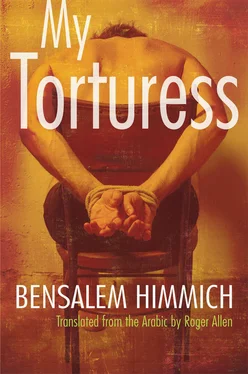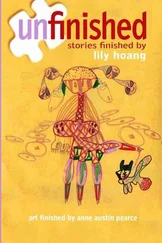When I returned to my cell, it was to find that my new cellmate, ‘Umar ar-Rami, had vanished into thin air, without leaving any note or the slightest trace. I felt exhausted and lay down, watching as night fell. I prayed for heaven’s mercy, begging for relief from my misery and help in comprehending what was happening to me and going on all around me every day.
8.My Session with Both the Investigating Judge and His Secretary, Nahid al-Busni
Next morning, I was shaken awake by a guard who escorted me to the administration wing and stopped me in front of a door.
“By order of his excellency, the investigating judge,” he told me, “you are to enter this bathroom, wash yourself, shave your beard, clean your teeth, powder yourself, then put on a new shirt and blue suit along with a necktie. You’ll find everything inside. I’ll be back in twenty minutes.”
He locked the door behind me and left. It took a moment for me to recover from my shock and surprise, but then I set about beating the time limit he had imposed. The hot water covered my entire body, and with the help of some soap and vigorous rubbing with a cloth, I got rid of most of the grime. Once I had finished washing, I dried myself with a big, soft towel, cleaned my teeth with a fresh toothbrush and toothpaste, trimmed my beard according to the correct Sunni practice, powdered myself, and then put on my new suit. They had forgotten just one thing: shoes to go along with the suit! Putting on a pair of rubber slippers, I sat on a chair. At this point I was scared, because the thought occurred to me that this cleansing routine might be the way prison officials used to deal with prisoners who were about to be executed — a sort of anticipatory wash of bodies that would soon be buried.
The only way I could find to keep my fear and confusion to myself was to concentrate even harder on cleaning my teeth and combing my hair back. When the guard suddenly came back into the room I swallowed the toothpaste in my mouth, and then expressed my thanks. I told him I was ready. I asked if I could bring my old clothes and some of the washing items with me.
“That’s all yours,” he said. “Throw your old clothes in this bin, and put the tie on.”
I had a hard time stuffing the washing materials in my pockets. He understood that I was no good at tying ties, so he helped me with that before escorting me to the investigating judge’s office.
An energetic young woman welcomed me with a smile.
“Nahid al-Busni at your service,” she told me softly as she offered me a chair. “His excellency is on the phone. .”
No. . the secretary with whom I had sat on the previous occasion was quite different from this polite and punctilious young woman. I began to assess how different the two of them were: this one was of medium stature while the earlier one had been exceptionally tall. Both of them were beautiful and neat, but their features were different. This new secretary’s demeanor, unlike the previous one, was much more modest and staid, while the transparent muslin head scarf that they both wore was not intended to hide their carefully coiffed hair.
The intercom bell rang, and the secretary took me into the judge’s office. He welcomed me with a smile and congratulated me on my freshened appearance. Asking Nahed to bring me something, he invited me to take a seat in front of him.
“Coffee or tea?” she asked.
“Bring him some semi-sweet coffee,” the judge told her as he fidgeted in the leather chair behind his huge desk.
Once she had left, he gave me another smile and fiddled with his clipped moustache.
“I used to know another woman from Fez,” he told me, “who used to pronounce the consonant ‘qaf’ as ‘hamza’; she also turned the ‘raa’ into ‘ghayn.’ Even worse was an Iraqi woman in my service — God forgive her — who used to turn ‘k’ and ‘j’ into all sorts of weird sounds. So, whenever she wanted to express her condolences to the relatives of someone who had died, she would say to each one individually: ‘May God increase your penis’ (intending to say ‘your reward,’ as I’m sure you’ve already realized). To God alone belongs all that He has created! But when it comes to typewriting, the secretary always sticks to the written form of the letters and not the way they are pronounced. I’ve hired this particular orphan woman because she is devout and respects the Creator. She has memorized his Holy Book and uses its teachings in her treatment of people who come for interviews. Her male and female colleagues call her Benazir, because her conduct and actually her appearance and head-wear as well remind people of Benazir Bhutto — may God preserve her as a wonderful model in this world of ours in anticipation of the next! In fact, this secretary is a great admirer of Benazir Bhutto, even though she is not interested or involved in politics.”
The young woman now brought me a cup of coffee and some pieces of chocolate.
“You’re not interested in politics, are you, pretty lady?” he teased the young secretary. “Go on, say ‘You’re so right,’” he said gesturing at me. “‘You’re so right’ is the only possible correct answer to this plague against our language. Only that way can you be sure of not committing some grave offence against the grammatical rules of the Arabic language. So tell us, ‘You’re so right.’”
“You’re so right!” she replied dutifully.
He then asked her to recite the shortest sura in the Qur’an. She really wanted to leave, but nevertheless recited it bashfully:
Verily we have given you abundanf,
So pray to your Lorf and sacrifife,
Verily the one who loathes you is clippef .
As she turned to leave, she was singing: “The man who tells me he loves me, I’ll serve him coffee with my own hands.”
“You can leave now,” the judge yelled with a smile. “May God forgive you that reading that I requested, just as he forgives the proponents of the seven readings of the Qur’an. But when it comes to Jumana, the previous secretary, who seems to have relied on her femininity alone, the Lord God will never forgive her the way she treated people with such violence and corrupted their piety with her flagrant sensuality. Weak-willed people and prisoners straying from their faith and practice were all proclaiming her name and falling in love with her. Tell me, did anything untoward happen to you while I was away?”
I stared at the floor and said nothing.
“That cursed woman,” he screamed angrily, baring his teeth, “that tart! I told her to treat you properly, and she promised to do so. Did she hit you? And anything else. .? Damned woman! Her case reminds me of another woman, even worse in the pre-Islamic era. If a great poet of his generation and lineage had not fallen in love with her and immortalized her in his famous mu‘allaqa poem,* she would have been unknown and forgotten for all time. Do you know who I’m referring to?”
I indicated that I did not. Clearing his throat, he sat up in his chair like someone about to convey some heavy news to me: “That pompous, flirtatious woman who strutted about like a peahen was the beloved of a poet who composed about her two lines of poetry that, by God Almighty, have no peers in the whole of secular Arabic literature. So remind me. It starts: ‘As I recall thee, the spears quench their thirst. . ’ Finish the line for me, Hamuda!”
I reluctantly responded: “. . on me, and the Indian swords drip with my blood.”
“O my God, how wonderful!” and “I longed to kiss the swords because. .” “Go ahead and finish it, Hamuda. .”
“they gleam like the teeth in your smiling mouth.”
“Even though the poet ‘Antara* recited such glorious and eloquent lines, the cursed ‘Abla was totally unaffected. Her heart never even fluttered. In fact, she rejected the black poet whose heart and mind were of purest white! Don’t you agree with me that this woman, ‘Abla, was cursed — not only that, but a prostitute and nasty racist at that?”
Читать дальше












